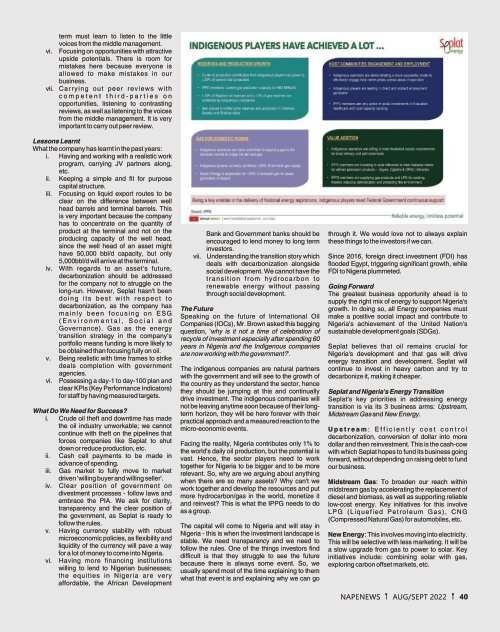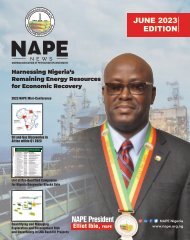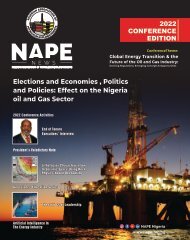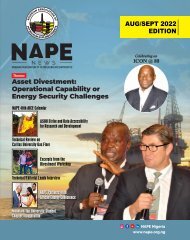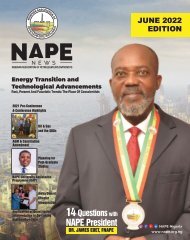You also want an ePaper? Increase the reach of your titles
YUMPU automatically turns print PDFs into web optimized ePapers that Google loves.
term must learn to listen to the little<br />
voices from the middle management.<br />
vi. Focusing on opportunities with attractive<br />
upside potentials. There is room for<br />
mistakes here because everyone is<br />
allowed to make mistakes in our<br />
business.<br />
vii. Carrying out peer reviews with<br />
c o m p e t e n t t h i r d - p a r t i e s o n<br />
opportunities, listening to contrasting<br />
reviews, as well as listening to the voices<br />
from the middle management. It is very<br />
important to carry out peer review.<br />
Lessons Learnt<br />
What the company has learnt in the past years:<br />
i. Having and working with a realistic work<br />
program, carrying JV partners along,<br />
etc.<br />
ii. Keeping a simple and fit for purpose<br />
capital structure.<br />
iii. Focusing on liquid export routes to be<br />
clear on the difference between well<br />
head barrels and terminal barrels. This<br />
is very important because the company<br />
has to concentrate on the quantity of<br />
product at the terminal and not on the<br />
producing capacity of the well head,<br />
since the well head of an asset might<br />
have 50,000 bbl/d capacity, but only<br />
5,000bbl/d will arrive at the terminal.<br />
iv.<br />
With regards to an asset's future,<br />
decarbonization should be addressed<br />
for the company not to struggle on the<br />
long-run. However, Seplat hasn't been<br />
d o i n g i t s b e s t w i t h r e s p e c t t o<br />
decarbonization, as the company has<br />
m a i n l y b e e n f o c u s i n g o n E S G<br />
( E n v i r o n m e n t a l , S o c i a l a n d<br />
Governance). Gas as the energy<br />
transition strategy in the company's<br />
portfolio means funding is more likely to<br />
be obtained than focusing fully on oil.<br />
v. Being realistic with time frames to strike<br />
deals completion with government<br />
agencies.<br />
vi.<br />
Possessing a day-1 to day-100 plan and<br />
clear KPIs (Key Performance Indicators)<br />
for staff by having measured targets.<br />
What Do We Need for Success?<br />
i. Crude oil theft and downtime has made<br />
the oil industry unworkable; we cannot<br />
continue with theft on the pipelines that<br />
forces companies like Seplat to shut<br />
down or reduce production, etc.<br />
ii. Cash call payments to be made in<br />
advance of spending.<br />
iii. Gas market to fully move to market<br />
iv.<br />
driven 'willing buyer and willing seller'.<br />
Clear position of government on<br />
divestment processes - follow laws and<br />
embrace the PIA. We ask for clarity,<br />
transparency and the clear position of<br />
the government, as Seplat is ready to<br />
follow the rules.<br />
v. Having currency stability with robust<br />
microeconomic policies, as flexibility and<br />
liquidity of the currency will pave a way<br />
for a lot of money to come into Nigeria.<br />
vi.<br />
Having more financing institutions<br />
willing to lend to Nigerian businesses;<br />
the equities in Nigeria are very<br />
affordable, the African Development<br />
Bank and Government banks should be<br />
encouraged to lend money to long term<br />
investors.<br />
vii. Understanding the transition story which<br />
deals with decarbonization alongside<br />
social development. We cannot have the<br />
t r a n s i t i o n f r o m h y d r o c a r b o n t o<br />
renewable energy without passing<br />
through social development.<br />
The Future<br />
Speaking on the future of International Oil<br />
Companies (IOCs), Mr. Brown asked this begging<br />
question, 'why is it not a time of celebration of<br />
recycle of investment especially after spending 60<br />
years in Nigeria and the Indigenous companies<br />
are now working with the government?'.<br />
The indigenous companies are natural partners<br />
with the government and will see to the growth of<br />
the country as they understand the sector, hence<br />
they should be jumping at this and continually<br />
drive investment. The indigenous companies will<br />
not be leaving anytime soon because of their longterm<br />
horizon, they will be here forever with their<br />
practical approach and a measured reaction to the<br />
micro-economic events.<br />
Facing the reality, Nigeria contributes only 1% to<br />
the world's daily oil production, but the potential is<br />
vast. Hence, the sector players need to work<br />
together for Nigeria to be bigger and to be more<br />
relevant. So, why are we arguing about anything<br />
when there are so many assets? Why can't we<br />
work together and develop the resources and put<br />
more hydrocarbon/gas in the world, monetize it<br />
and reinvest? This is what the IPPG needs to do<br />
as a group.<br />
The capital will come to Nigeria and will stay in<br />
Nigeria - this is when the investment landscape is<br />
stable. We need transparency and we need to<br />
follow the rules. One of the things investors find<br />
difficult is that they struggle to see the future<br />
because there is always some event. So, we<br />
usually spend most of the time explaining to them<br />
what that event is and explaining why we can go<br />
through it. We would love not to always explain<br />
these things to the investors if we can.<br />
Since 2016, foreign direct investment (FDI) has<br />
flooded Egypt, triggering significant growth, while<br />
FDI to Nigeria plummeted.<br />
Going Forward<br />
The greatest business opportunity ahead is to<br />
supply the right mix of energy to support Nigeria's<br />
growth. In doing so, all Energy companies must<br />
make a positive social impact and contribute to<br />
Nigeria's achievement of the United Nation's<br />
sustainable development goals (SDGs).<br />
Seplat believes that oil remains crucial for<br />
Nigeria's development and that gas will drive<br />
energy transition and development. Seplat will<br />
continue to invest in heavy carbon and try to<br />
decarbonize it, making it cheaper.<br />
Seplat and Nigeria's Energy Transition<br />
Seplat's key priorities in addressing energy<br />
transition is via its 3 business arms: Upstream,<br />
Midstream Gas and New Energy.<br />
U p s t r e a m : E f f i c i e n t l y c o s t c o n t r o l<br />
decarbonization, conversion of dollar into more<br />
dollar and then reinvestment. This is the cash-cow<br />
with which Seplat hopes to fund its business going<br />
forward, without depending on raising debt to fund<br />
our business.<br />
Midstream Gas: To broaden our reach within<br />
midstream gas by accelerating the replacement of<br />
diesel and biomass, as well as supporting reliable<br />
low-cost energy. Key initiatives for this involve<br />
LPG (Liquefied Petroleum Gas), CNG<br />
(Compressed Natural Gas) for automobiles, etc.<br />
New Energy: This involves moving into electricity.<br />
This will be selective with less marketing. It will be<br />
a slow upgrade from gas to power to solar. Key<br />
initiatives include: combining solar with gas,<br />
exploring carbon offset markets, etc.<br />
NAPENEWS AUG/SEPT <strong>2022</strong> 40


